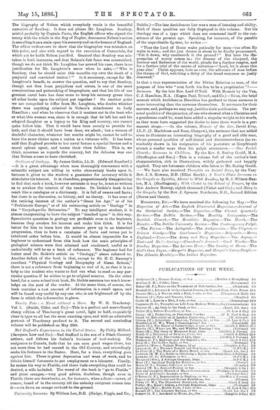Outlines of Geology. By James Geikie, LL. D. (Edward Stanford.)
—It is a great advantage when men thoroughly conversant with a scientific subject are willing to write elementary books upon it, because it gives to the student a guarantee for accuracy while it stimulates his interest. It is, therefore, proportionately disappointing to find that such a book, however accurate it may be, is not so written as to awaken the interest of the reader. Dr. Geikie's book is too much like a catalogue or a dictionary. It is fall of names and facts; but there is no discussion, no history, and no theory. It has none of the enticing interest of the author's " Great Ice Age," or of his "Prehistoric Europe," or of his entrancing article on " Geology " in the " Encyclopaedia Britannica." To any intelligent student, it is almost exasperating to have the subject "touched upon" in this way. Speculative questions in geology are profitable even to the beginner, because they awaken his interest and make him think. It is far better for him to learn how the science grew up in an historical progression, than to have a catalogue of facts and terms put in tabulated order before him. It would be almost impossible for a beginner to understand from this book how the main principles of geological science were first attained and confirmed, useful as it undoubtedly will be as a book of reference. The beginner had far better read Dr. Geikie's article on " Geology," above referred to. Another defect of the book is that, except to Sir H. C. Ramsay's excellent "Physical Geology and Geography of Great Britain," there is not a reference from beginning to end of it, so that it is no help to the student who wants to find oat what to read on any par- ticular question if he wishes to go to original sources. On the other hand, for a mere school text-book, Dr. Geikie assumes too much know- ledge on the part of the reader. Al the same time, of course, the book contains a vast amount of information in a small space, and will be found very useful by any one who is not frightened off by the form in which the information is given.


































 Previous page
Previous page